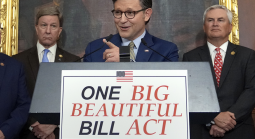William Weld, Libertarian V.P. Candidate, Brought Gambling to Mass as Governor
With Libertarian Party presidential candidate Gary Johnson now polling at 12% in some national polls--and as high as 17% in some individual state polls--his star is rising.
AD: Get Up to $1000 in Free Bets – Bet on Every State Election Results at BetOnline
Although he didn't qualify for the first presidential debate, which is next Monday, if his national polling rises to at least 15% by the time of the second presidential debate, in October, he will be allowed on the debate stage alongside Democratic presidential candidate Hillary Clinton and Republican presidential candidate Donald Trump.
Johnson's running mate is Libertarian Party vice-presidential candidate William Weld.
As part of its ongoing series on the 2016 candidates and their views on gambling, Gambling 911 previously detailed Johnson's stance on various gambling issues.
For the final installment in the series, Gambling 911 examined Weld's record on any and all things gambling.
The verdict?
Early in his political career, Weld opposed gambling.
But then he did a turnaround, and now he supports it.
Here's what Gambling 911 found:
Weld, 71, a Republican and Harvard graduate, began his political career in 1981 as a U.S. attorney for Massachusetts, appointed to the position by President Ronald Reagan.
In 1990 he was elected governor of Massachusetts, and then was re-elected four years later.
In 1996, he ran for senator, but lost to John Kerrey.
Then, in 1997, President Bill Clinton nominated him to be ambassador to Mexico, and he resigned as governor of Massachusetts.
The nomination, however, was not confirmed by the U.S. Senate, so Weld suddenly found himself out of politics--neither an ambassador nor a governor.
Itching to get back in the game, in 2000 he moved back to the State of New York, where he was born, and in 2006 he ran for governor of that state, trying to become only the second person in U.S. history, after Sam Houston, to be elected governor of two different states.
He failed to get the nomination and that was the end of his political career--until this year, when Johnson tapped him to be his running mate.
So what exactly is Weld's record when it comes to gambling?
As a U.S. attorney, Weld opposed gambling.
But when he became governor of Massachusetts, he did an about-face and embraced it, citing it as an economic stimulus for the Bay State.
According to an article by United Press International in January of 1997, which can be seen here, Weld is "pressing legislators to approve casino gambling in Massachusetts as he unveils a record $18.2 billion budget for the coming fiscal year. Weld says expanded legalized gambling could pump $90 million a year into the state coffers. Weld's proposals would allow a gambling casino run by the Wampanoag Indian tribe in New Bedford, a second casino in western Massachusetts and some 700 slot machines at each of the state's four racetracks."
Weld is credited with getting the ball rolling in bringing casino gambling to the State of Massachusetts, which today has a total of almost a dozen Indian or commercial casinos either in existence or under construction.
Before Weld's push, the Bay State had only horse and dog racing and a state lottery, as forms of legalized gambling.
By Tom Somach
Gambling 911 Staff Writer














